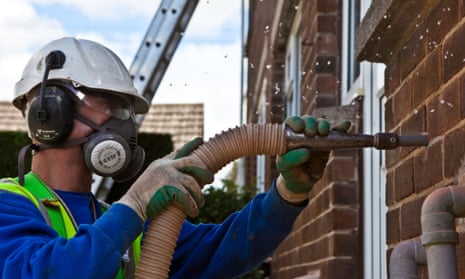A government cashback scheme offering £7,600 to people improving the energy efficiency of their homes has been slammed shut overnight after a last-minute surge of applications threatened to blow the budget.
The green deal home improvement fund (GDHIF) was intended to give a boost the government's flagship energy efficiency programme, which is widely seen as a failure, having attracted few takers and caused loft and cavity wall insulations to crash.
However, the new, simpler and more generous cashback scheme launched in June was popular and on Tuesday the Department of Energy and Climate changed said it would cut the maximum payout from Friday, after £50m of the £120m budget had been taken.
The warning apparently sparked a rush to apply and the final £70m was grabbed in just three days, leading Decc to halt the scheme with immediate effect at 6.30pm on Thursday evening.
The final £70m was taken by about 9,500 applicants, showing they were all applying for close to the maximum amount, which is given to those installing insulation to solid walls. The popularity of the scheme was boosted by including a refund of the green deal assessment fee, usually around £100.
Daily rate of applications for cashback under the green deal home improvement fund
This article includes content hosted on e.infogr.am. We ask for your permission before anything is loaded, as the provider may be using cookies and other technologies. To view this content, click 'Allow and continue'.
Decc minister Amber Rudd said: “In a short space of time the GDHIF has proved extremely popular. We were always clear there was a budget which is why we encouraged people to act quickly. As a result, thousands more families will now benefit from government help to have warmer homes which use less energy.”
However, Richard Twinn, at the UK Green Building Council, said: “The sudden and immediate closure of this fund is another setback for the energy efficiency industry because companies have specifically geared up to market and deliver through this scheme. These constant changes are not helpful to industry.
He added: "This does demonstrate that we need long-term drivers, not short term pots of cash to avoid this continual cycle of boom and bust.” The energy efficiency industry has claimed that thousands of jobs have been lost due to problems with the green deal.
Neil Schofield, from boiler manufacturer Worcester, Bosch Group, said “The tragedy is that, for once, Decc has come up with a scheme that works. It’s a body blow and a triumph for short-termism.”
Jonathan Reynolds, shadow energy minister said: “This is a shocking act of incompetence. It will leave many customers who have paid £100 for a green deal assessment out of pocket, with little prospect of them having the work they were promised done, and an insulation industry in despair at the stop-start nature of this government’s policy."
The green deal was intended to upgrade the energy efficiency of many millions of homes. The key part of the policy is a loan scheme to give homeowners access to upfront cash to fund insulation measures, with the loan repaid via savings on energy bills. But a complex application process and interest rates seen as unattractive mean just 3,800 people have so far taken up the offer.
An earlier, less generous cashback scheme did attract interest but virtually all of that cash was given to people replacing boilers, for which they received a maximum of £270.
This article includes content hosted on e.infogr.am. We ask for your permission before anything is loaded, as the provider may be using cookies and other technologies. To view this content, click 'Allow and continue'.








Comments (…)
Sign in or create your Guardian account to join the discussion